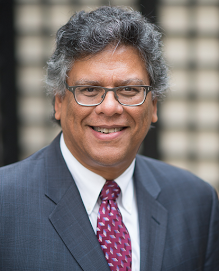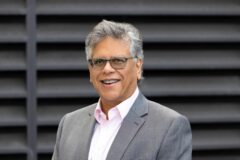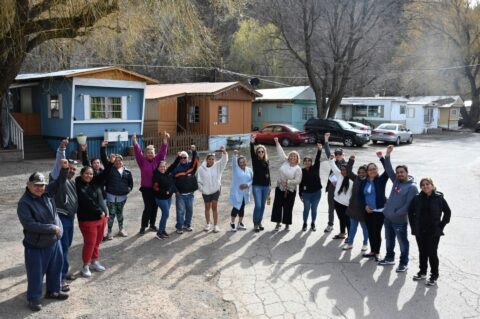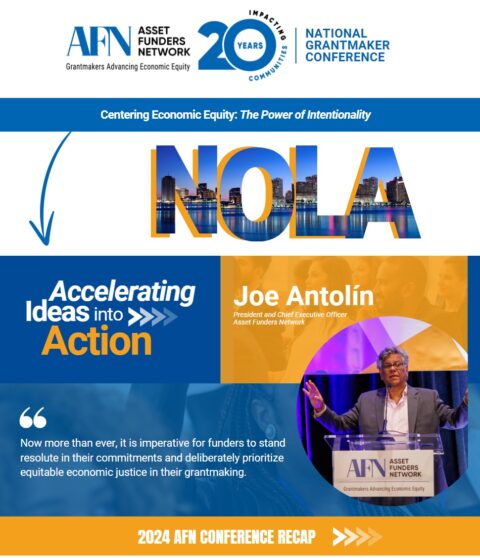 FROM THE PRESIDENT AND CEO
FROM THE PRESIDENT AND CEO
APRIL 2021
AFN’s mission is to engage philanthropy and financial institutions, to invest in equitable wealth building and foster economic mobility. Funders and grantees are often more comfortable in efforts that are more ameliorative than investments that lead to achieve system change; but there are increasingly many members and voices that are impatient. To achieve equity in wealth building and economic mobility, the actions needed are both about changing systems to uproot racial and gender advantages and creating opportunity.
But the challenge is far more nuanced because of American history and the policy and economic support choices made over that history. The economic prosperity choices that helped create the American dream were supported by significant public investments when the recipients were white and morphed into different realities for those who were not white. These are explored in Isabel Wilkerson’s Caste or Heather McGhee’s The Sum of Us. The past year required us to confront unvarnished truths that these and many other leading voices have raised demanding that philanthropic organizations take stock of where they have acted and where action is needed to build economic well-being and economic mobility.
This month AFN released From Relief to Resilience: Reimagining Investments. In this brief, AFN presents a framework building on past recommendations for funders that explicitly place racial and gender equity at the forefront to map more just paths to economic resilience. At the same time, we recognize the diverse needs of communities and thus elevate a continuum of strategies that funders can apply immediately, in the mid-term, and over the long term, by supporting on-the-ground programs and systemic solutions. The brief provides funders with multiple points of entry to reimagine investments and operationalize equity. It starts with research that makes the case for reimagining. Then, it introduces a detailed framework that centers equity. Recommendations and reflection questions for implementation follow. The brief ends with case stories that provide examples of equity integration in action. Engaging at any level helps us all eliminate the disparities in our economic system that have persisted for too long.
Over the next year, AFN will continue with our Peer-to-Peer: Place-Based Insights and Action. This series of monthly sessions centers around AFN’s seven issue areas:
- Small Business Ownership
- Financial Health
- Wealth Gaps
- Employment & Income
- Post-Secondary Education
- Health
- Housing
These 75-minute member-only virtual sessions will foster authentic dialogue and showcase peers’ framing and approach to issues that we care deeply about. Together, we will explore models across the country and responses to changing policy environments, validating and challenging each other’s work for greater impact, alignment, and efficacy.
There is a great need for many philanthropic investments – each of which separately is necessary but insufficient until they are woven together and brought to scale with public and private policy change. A commitment to be inclusive, embrace diversity, and to advance equity is a necessary framework. Actions ending poverty narratives, expanding subsidized housing, and reinventing public income supports is necessary, but alone will not close the wealth gap. Extending the child care tax credit into permanent policy, is huge and necessary, but insufficient to close the wealth divides. Each necessary, but not sufficient investment will have greater impact if the full economic, historic and racial bias context is understood. Then the impact discussion can focus on wealth building:
- How did this action contribute to, and align with, systemic change and opportunity creating efforts to improve the household balance sheets across the community?
- Are we effectively growing the pie with an abundance framework to allow everyone the opportunity to security, prosperity through wealth building and ownership, and creating generational economic mobility?
The possibility for transformative change is more open than it has been in decades, with a rejection of the scarcity or fixed pie narrative that for most of our lifetimes has severely constrained public investment in wealth building and prosperity of all. Rejecting the zero sum economics of the past and the racialized hierarchy of the American caste system are battles and victories where philanthropy can and will lead us.
Join AFN and inform your peers, align your efforts, and let’s make transformative change together.


